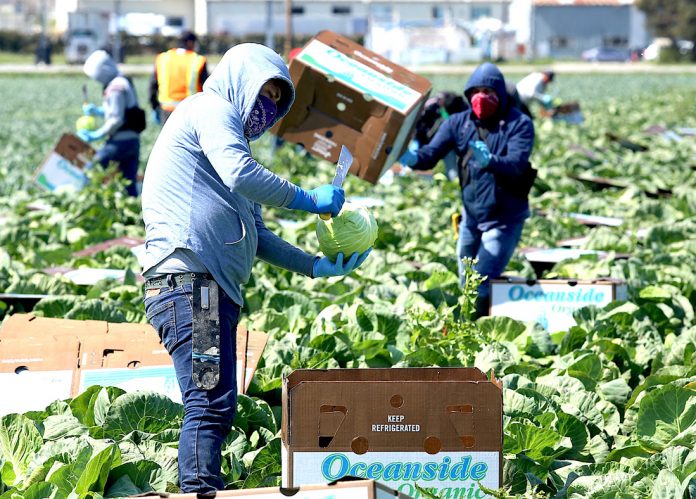
WATSONVILLE—As shoppers flock to grocery stores, stocking up on fresh, frozen and canned foods, California farms are working to keep up with the demand.
In Watsonville, large and small farms alike are sending unprecedented amounts of products to local and national stores, as well as markets and restaurants—and they will continue to, despite the mad dash.
“It’s hard to tell people to stop buying so much,” said Lakeside Organic Gardens owner Dick Peixoto. “The shelter-in-place order… makes them feel like they have to grab anything they can. But the food is still here. We are still growing.”
With shelter-in-place in effect, only businesses deemed “essential” are allowed to stay open and in production. This includes companies that produce and sell food, such as farms.
But the increased demand, while good for business, has put a strain on the farms and their employees.
“Things are changing by the week, day, minute,” said Peixoto. “On one hand, it’s definitely helping the business. But with restaurants being shut down, a limited workforce… it has presented challenges.”
Peixoto’s own restaurant, California Grill, remains closed until at least April 30.
“But as we know, that can change at any time,” he said.
Farmworker protections
A major concern across the country since the outbreak of COVID-19 is farmworkers’ safety. People who harvest the fields often work shoulder-to-shoulder, but many of them still do not have access to face coverings or other protective equipment.
Last week, Lakeside publicly released a set of company-wide regulations for those working in their fields. This included implementing social distancing standards for harvesting, continuous sanitization of machinery, toilets and other equipment, and the closure of company break rooms.
“There is a lot of exposure out there, so you have to take it seriously,” Peixoto said. “We’re all doing our best to make sure everyone is staying healthy.”
At the state level, Assemblymember Robert Rivas (D-Hollister) this week introduced the California Farmworker COVID-19 Relief Package, which proposes to expand employees’ paid sick leave, provide supplemental hazard pay, extend tax credit to those who work overtime, expedite temporary housing and fund an outreach education campaign.
“Farmworkers are the unsung heroes who help keep our country fed,” Rivas said. “I feel a personal responsibility to make sure we take care of them, just like they take care of us.”
Small scale, big impact
Watsonville’s Live Earth Farm is also feeling the effects of COVID-19 in terms of production and demand, although on a smaller scale.
Since shelter-in-place took effect, the small organic farm’s Community Supported Agriculture (CSA) program has taken off. The program allows farms to offer seasonal products (typically a box of vegetables) to local residents each week throughout the farming season.
As of this week, Live Earth’s CSA is at capacity, with a waitlist.
“We’re a small grower,” said owner Tom Broz.”We’ve definitely been challenged to keep up.”
Broz said that small farms have had to change how they market and distribute product. With restaurants being closed, many are shifting to prepared boxes, with drop off locations and other services.
“The industry continues to change,” Broz said. “I don’t know how exactly things will play out.”
However, Broz said that his farm is benefiting from local farmer’s markets remaining open.
“Markets are a vital source,” he said. “We are so thankful they are open and being supported.”
The bottom line
Recent rains hit the Pajaro Valley hard this week, but according to Broz, it was perfect timing.
“Production is low at this time of year anyway,” he said. “With the dry February we had, we were able to prepare for the wet weather. As long as things dry out soon… our trees can pollinate and things can get going.”
Both he and Peixoto said that despite the myriad of challenges that lie ahead due to COVID-19, they are optimistic, and urge the public to relax.
“Back off the panic, because it is just compounding the problem,” Peixoto said. “If you just buy as you normally buy, there will be enough for everyone.”
Broz agreed.
“We have the tools and the seeds, the ability to grow food for our community,” he said. “Do not worry.”










